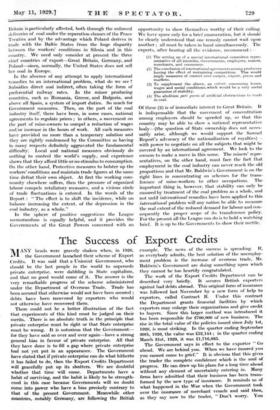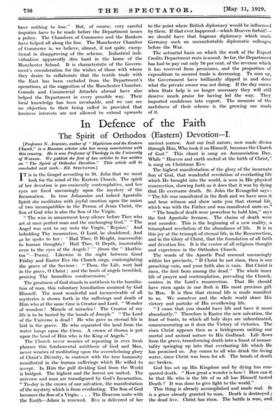The Success of Export Credits
MANY heads were gravely shaken when, in 1926, the Government launched their scheme of Export Credits. It was said that a Unionist Government, who should be the last people in the world to supersede private enterprise, were dabbling in State capitalism, and that no good would come of it. The answer is the very remarkable progress of the scheme administered under the Department of Overseas Trade. Trade has been secured that otherwise would not have been secured ; debts have been recovered by exporters who would not otherwise have recovered them.
- There could not be a better illustration of the fact that experiments of this kind must be judged on their merits. There is no absolute truth in the principle that private enterprise must be right or that State enterprise must be wrong. It is notorious that the Government— for they have said so over and over again—have a strong general bias in favour of private enterprise. All that they have done is to fill a gap where private enterprise had not yet put in an appearance.. The Government have stated that if private enterprise can do what hitherto it has failed to do, then the Export Credits Department will gracefully put up its shutters. We are doubtful whether that time will come. Departments have a habit of surviving, and the habit is likely to be strength- ened in this case because Governments will no doubt come into power who have a bias precisely contrary to that of the present Government. Meanwhile other countries, notably Germany, are following the British example. The news of the success is spreading. If, as everybody admits, the best solution of the unemploy- ment problem is the increase of overseas trade, Mr. Baldwin's Government are doing something upon which they cannot be too heartily congratulated.
The work of the Export Credits Department can be described very briefly. It secures British exporters against bad debts abroad. This original form of insurance was followed last November by a new form of help to exporters, called Contract B. Under this contract the Department grants financial facilities by which exporters may enlarge their organizations and give credit to buyers.' Since this larger method was introduced it has been responsible for £700,000 of new business. The rise in the total value of the policies issued since July 1st, 1926, is most striking. In the quarter ending September 30th, 1926, the value was £52,144 ; in the quarter ending March 81st, 1929, it was £1,716,885.
The Government says in effect to the exporter " Go ahead. We are behind you. When we have insured you you cannot come to grief." It is obvious that this gives the trader the complete confidence which is the soul of progress. He can draw up his plans for a long time ahead without any element of uncertainty entering in. Many firms have admitted that their business has been trans- formed by the new type of insurance. It reminds us of what happened in the War when the Government took over the insurance of merchant vessels and said then, as they say now to the trader, " Don't worry. You have nothing to lose." But, of course, very careful inquiries have to be made before the Department issues a policy. The Chambers of Commerce and the Bankers have helped all along the line. The Manchester Chamber of Commerce is, we believe, almost, if not quite, excep- tional in disapproving of the scheme. Industrial indi- vidualism apparently dies hard in the home of the Manchester School. It is characteristic of the Govern- ment's consideration for the wishes of those with whom they desire to collaborate that the textile trade with the East has been excluded from the Department's operations, at the suggestion of the Manchester Chamber. Consuls and Commercial Attaches abroad have also helped the Department in every possible way. Their local knowledge has been invaluable, and we can see no objection to their being called in provided that business interests are not allowed to extend upwards to the point where British diplomacy would be influenced by them. If that ever happened—which Heaven forbid !- we should have that bagman diplomacy which made Germany such an uncomfortable diplomatic colleague before the War.
The actuarial basis on which the work of the Export Credits Department rests is sound. So far, the Department has had to pay out only 70 per cent. of the revenue which it has received from premiums, and the proportion of expenditure to secured trade is decreasing. To sum up, the Government have brilliantly slipped in and done what the private owner was not doing. If the day comes when State help is no longer necessary they will still deserve much praise for having led the way. They imported confidence into export. The measure of the usefulness of their scheme is the growing use made of it.











































 Previous page
Previous page